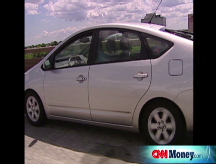Drivers blame D.C. for high gas prices
More than three-quarters of consumers say the government's energy policies are to blame for record fuel costs, according to Consumer Reports.
NEW YORK (CNNMoney.com) -- Fed up with record gas prices, drivers often scapegoat big oil companies for high prices at the pump, but in a recent survey, more Americans directed their scorn towards Washington lawmakers.
According to a Consumer Reports Auto Pulse Survey released Thursday, 77% of consumers said the root of high gas prices lies with the government's failure to implement an effective energy policy. That compares with 75% of drivers who blamed oil companies, 70% who said foreign oil producers were at fault and 68% who thought the Middle East conflict was a leading cause for record fuel costs.
Gas prices now sit at a little less than $4.07 per gallon on average according to AAA, which is about a penny off the record set earlier this month. But if gas prices reach $4.32, the median breaking-point for all drivers surveyed, the nearly 900 respondents said they would reduce their driving habits even further.
"This marks a much narrower margin between national average prices and the median tipping point than in last year's survey," the study noted. "[That] signal[s] that consumers now have less flexibility in their budgets."
Even with the current cost of fuel, almost 31% of the respondents said they walked or bicycled more, and 16% took better advantage of public transportation. One in ten said they moved so they could live closer to their work.
That's because Americans are feeling the impact of record gas prices in their pocketbooks. Nearly half of those surveyed said they are saving less, and 24% said they cut back on essentials like food and health care costs.
As a result, 90% of those surveyed support an increase in alternative energy development, and 81% want the U.S. government to allow more drilling on and off our nation's shores. Americans also favored conservation measures, with 83% saying they supported tax incentives for alternate transportation.
And for those who haven't adjusted their behaviors, the kinds of cars people drive are changing as well. In last year's survey, only 47% said they were interested in alternative engine types like hybrids, flex-fuel vehicles, or diesel engines. But this year, 80% said they would consider buying a car with an alternate-style engine, and 54% said they would pay extra for a more fuel-efficient vehicle.
If it wasn't clear how pinched American drivers are feeling from the rest of the survey's data, 15% of respondents even said they would even compromise on their vehicle's safety to save on gas. ![]()



